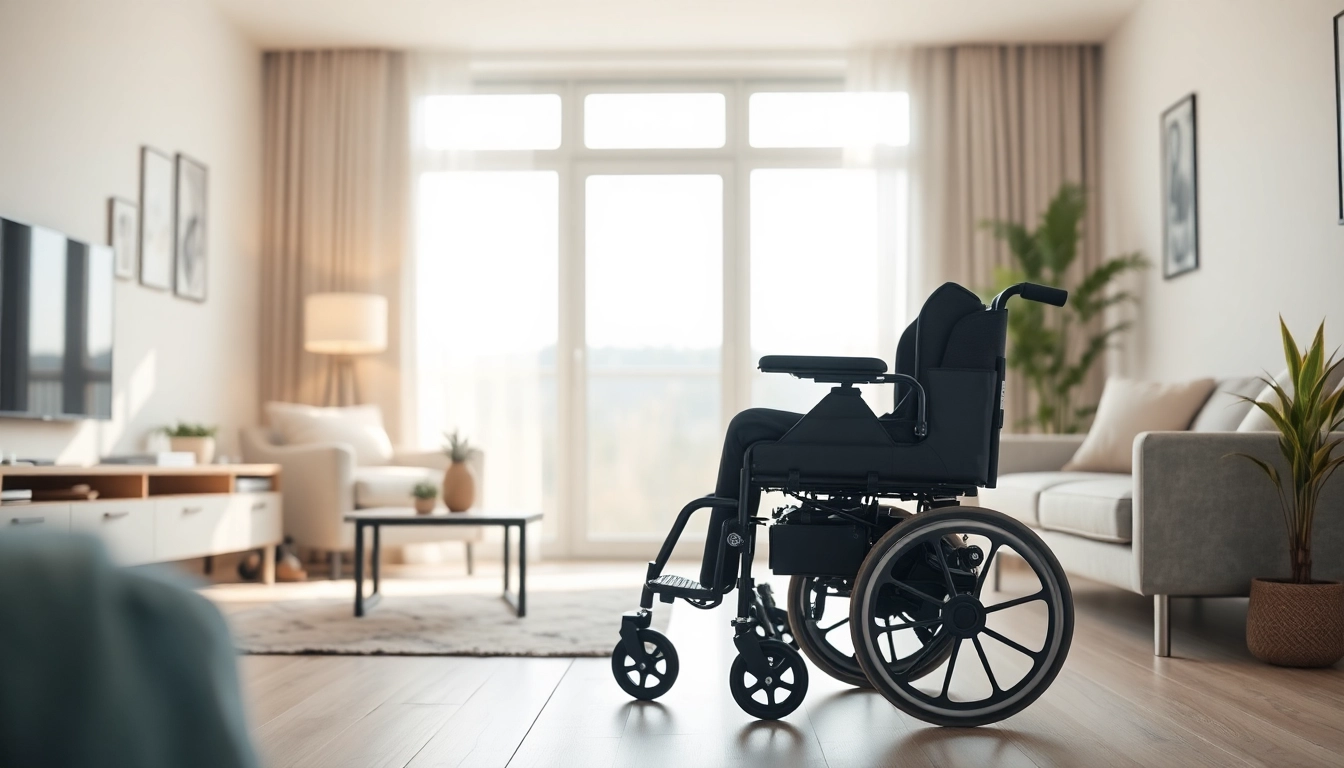Understanding Power Wheelchairs
Power wheelchairs are essential mobility devices that provide individuals with reduced mobility the independence and freedom to navigate their environment. These sophisticated machines are designed for ease of use, comfort, and functionality. This article takes an in-depth look into what a power wheelchair is, the various types available, its benefits, and vital considerations to keep in mind when selecting one. If you’re looking to enhance your mobility with a Power wheelchair, this guide serves to inform your decision-making process.
What is a Power Wheelchair?
A power wheelchair, also known as a motorized wheelchair, is a mobility aid that is powered by an electric motor. Unlike manual wheelchairs, which require physical strength to propel forward, power wheelchairs offer a more effortless riding experience as they are operated using batteries. These devices are ideal for people with severe mobility challenges or those who find it difficult to navigate basic mobility tasks.
Power wheelchairs come equipped with various controls, from joystick mechanisms to switches, providing users the ability to maneuver in tight spaces with ease. Their design caters to individuals who may have limited upper body strength or control, making them a suitable option for a broader audience.
Types of Power Wheelchairs Available
Power wheelchairs come in several types, each tailored for specific environments and user requirements. Understanding these can help you make an informed choice:
- Standard Power Wheelchairs: These are designed for indoor and outdoor use, balancing portability and functionality. They typically have sturdier frames and can handle varied terrain.
- Heavy Duty Power Wheelchairs: Built for larger users or those needing additional support, these models have reinforced frameworks and higher weight capacities, providing stability and strength.
- Compact or Portable Power Wheelchairs: Ideal for travel, these models can often be disassembled for easy transport. They are lightweight yet sturdy, suitable for users who are frequently on the go.
- All-Terrain Power Wheelchairs: As the name suggests, these wheelchairs are designed to handle rougher terrains and outdoor settings, featuring robust tires and enhanced suspension systems.
- Sports Power Wheelchairs: Tailored for active users, these models focus on maneuverability and speed, allowing for competitive activities while still assuring safety and comfort.
Benefits of Using a Power Wheelchair
Adopting a power wheelchair can dramatically influence the user’s quality of life. Here are some key benefits:
- Enhanced Mobility: Power wheelchairs enable users to navigate their surroundings independently, which fosters a sense of autonomy.
- Improved Comfort: Equipped with ergonomic designs and adjustable seats, many power wheelchairs offer superior comfort over long periods.
- Time-Saving: Users can travel longer distances without exhausting themselves, thus saving time on daily tasks.
- Customizable Features: Many power wheelchairs come with options to adjust seating, armrests, and footrests, allowing for a tailored fit to individual needs.
- Reduced Strain: For individuals with limited strength or stamina, using a power wheelchair minimizes physical effort, thereby reducing fatigue.
Key Features to Consider
Before purchasing a power wheelchair, there are several features you must evaluate to ensure the device fits your lifestyle and needs:
Battery Life and Performance
The battery life of a power wheelchair is one of the most critical factors to consider. Different models offer varying battery capacities, affecting how far a user can travel on a single charge. It’s essential to look for models that provide:
- Long Range: The ability to cover extensive distances is crucial, especially for users who need their wheelchair for outdoor activities.
- Fast Charging: Look for wheelchairs that offer quick charging time, ensuring that the unit is ready for use in a timely manner.
In addition, performance metrics, including speed and handling, should also be evaluated to ensure the wheelchair matches your mobility preferences.
Comfort and Ergonomics
Given that users may spend prolonged periods in their power wheelchairs, comfort is paramount. Key considerations include:
- Seat Cushions: High-quality cushioning materials that conform to the body can prevent pressure sores and increase comfort.
- Adjustable Components: Features such as adjustable armrests, footrests, and back supports are crucial for personalized comfort.
- Weight Distribution: Properly designed wheelchairs distribute weight evenly to reduce stress on the user’s body.
Customization Options for Power Wheelchairs
Customizing your power wheelchair can lead to significant improvements in both comfort and utility. Consider looking for options like:
- Seat Positioning and Adjustments: Options that allow for changes in height or tilt can enhance user comfort and utility.
- Accessories and Attachments: Adapters for carrying personal items, cup holders, or additional control aids can vastly improve usability.
Assessing Your Needs
Selecting the right power wheelchair involves understanding your specific mobility needs. Here are some steps to effectively assess your requirements:
Evaluating Your Mobility Requirements
Begin by evaluating your daily routine and the environments where you plan to use your wheelchair. Factors to consider include:
- Your physical limitations and the extent of your mobility challenges.
- Typical terrains (e.g., rough pavements versus smooth indoor floors).
- How often you will use the wheelchair for outdoor activities or long distances.
Finding the Right Fit
A power wheelchair must cater to individual body dimensions and mobility needs. Here’s how to ensure you find a proper fit:
- Measurements: Take accurate measurements of your body to match the wheelchair’s dimensions. Ensure seat depth, width, and height allow for comfortable positioning.
- Test Drives: Try out different models in various settings to determine which best suits your maneuverability and comfort requirements.
Consulting with Health Professionals
Before making a purchase, it’s advisable to consult health professionals such as physical therapists or occupational therapists. They can provide valuable insights into:
- Your specific mobility needs based on your health condition.
- Recommendations on suitable wheelchair models and configurations.
Maintenance and Care
Regular maintenance is essential to keep power wheelchairs functioning optimally. Following a well-defined care routine can prolong the wheelchair’s lifespan and performance:
Routine Maintenance for Power Wheelchairs
Routine maintenance includes several tasks to ensure that the wheelchair remains in excellent working order:
- Battery Care: Charge the battery regularly and monitor its performance to ensure reliability.
- Visual Inspections: Regularly check for wear and tear on the wheels, frame, and electrical components.
- Cleansing: Keep the wheelchair clean by wiping down surfaces to prevent dirt build-up.
Troubleshooting Common Issues
Users may encounter common issues with their power wheelchairs. Here are some troubleshooting tips:
- Non-Responsive Controls: Check the battery connections and ensure the joystick is free of obstructions.
- Squeaking or Noises: Remove debris from the wheels and lubricate moving parts as required.
Long-Term Care Tips
Aside from routine maintenance, here are tips to ensure long-term care:
- Invest in protective covers to shield your wheelchair from the elements when not in use.
- Schedule yearly professional maintenance checks to ensure all systems are functioning correctly.
Choosing a Provider
Selecting the right provider for your power wheelchair is as important as choosing the wheelchair itself. Here are some steps to guide your decision:
Researching Reliable Suppliers
Start by researching suppliers that specialize in power wheelchairs. Look for:
- Established companies with positive customer reviews.
- Suppliers who offer various brands and models, providing you with options.
Comparing Prices and Features
While price is an important consideration, it should not be the only one. Evaluate:
- The features included with the wheelchair.
- After-sales support and warranty options available.
Understanding Warranty and Support Options
While evaluating suppliers, it is crucial to ensure that they offer comprehensive warranty and support options. A good warranty can protect your investment and provide peace of mind, covering repairs and replacements if necessary.
In conclusion, choosing the right power wheelchair involves assessing your personal needs, evaluating features, and working closely with healthcare professionals and reliable suppliers. With the right information and support, power wheelchairs can dramatically improve mobility and enhance the quality of life for users.















Leave a Reply